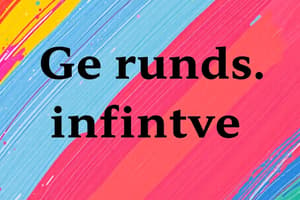Podcast
Questions and Answers
Gerunds follow the pattern of verb + ______
Gerunds follow the pattern of verb + ______
ing
The infinitive form follows the pattern of ______ + verb.
The infinitive form follows the pattern of ______ + verb.
to
The passive form of gerunds uses the pattern being + ______.
The passive form of gerunds uses the pattern being + ______.
P.P.
Examples such as 'try', 'stop', and 'forget' are verbs commonly used with ______ and infinitives.
Examples such as 'try', 'stop', and 'forget' are verbs commonly used with ______ and infinitives.
To discuss an action that has ended, one may use ______ in their explanation.
To discuss an action that has ended, one may use ______ in their explanation.
Flashcards
Gerund
Gerund
A verb ending in -ing used as a noun.
Infinitive
Infinitive
A verb form preceded by "to", used as a noun, adjective, or adverb.
Gerund Active Voice
Gerund Active Voice
A gerund used to describe an action.
Infinitive Active Voice
Infinitive Active Voice
Signup and view all the flashcards
Gerunds vs. Infinitives
Gerunds vs. Infinitives
Signup and view all the flashcards
Study Notes
Gerunds and Infinitives
- Gerunds: verb + -ing (e.g., shopping, talking)
- Infinitives: to + verb (e.g., to shop, to talk)
Active vs. Passive Voice
- Active voice: subject performs the action (e.g., He stopped.)
- Passive voice: subject receives the action (e.g., He was stopped.)
Verbs Followed by Gerunds or Infinitives
- Some verbs are followed by gerunds (e.g., I dislike cheating).
- Some verbs are followed by infinitives (e.g., I want to be happy).
Examples of Verb Choices
- Stop: Use "stop" + -ing to indicate a cessation of an ongoing action, or "stop" + to-infinitive to indicate a temporary halt for a new action.
- Remember/Forget: These verbs usually take gerunds to describe activities or events already in memory.
- Regret: Often followed by a gerund expressing something regretted in the past.
- Mean: This verb usually takes an infinitive to describe a result or consequence.
Sequence of Events
- "Went on" (doing something) implies continuing an action. Use verbs like "went on" to describe actions that continue.
Other Examples of Verb Choices
- Begin, Continue, Start, Stop: Usually followed by gerunds to indicate a continuing action.
- Regret: Frequently followed by a gerund, expressing past actions that the speaker later feels negatively about.
- Mean: Usually takes an infinitive, implying a result or consequence, such as "success meant changing career plans."
Examples in Context
- Customers who shopped at the new supermarket had a goal of being the lucky customer.
- He tried to get the book on top of the shelf.
- I regret doing things for money.
- He went on performing for the rest of his life.
- He stopped performing to audiences in 2001.
- He stopped to talk to his fans.
- One morning, Edward learned that his trolley was free.
- He went back to the store to get tea,
- Manager congratulated him on winning,
Studying That Suits You
Use AI to generate personalized quizzes and flashcards to suit your learning preferences.





